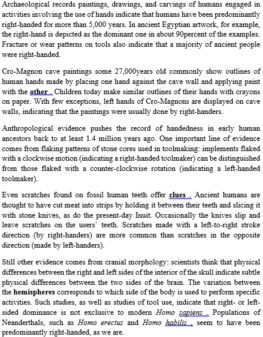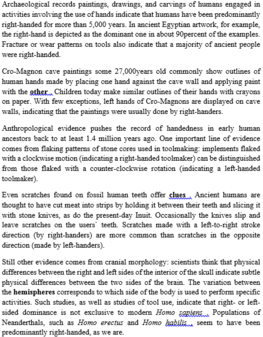Read the following passage and mark the letter A, 11, C, or D on your answer sheet to indicate the correct answer to each of the questions from 36 to 42.
Christina and James met in college and have been dating for more than five years. For the past two years, they have been living together in a condo they purchased jointly. While Christina and James were confident in their decision to enter into a commitment like a 20-year mortgage, they are unsure if they want to enter into marriage. The couple had many discussions about marriage and decided that it just did not seem necessary. Wasn't it only a piece of paper? And didn't half of all marriages end in divorce?
Neither Christina nor James had seen much success with marriage while growing up. Christina was raised by a single mother. Her parents never married, and her father has had little contact with the family since she was a toddler, Christina and her mother lived with her maternal grandmother, who often served as a surrogate parent. James grew up in a two-parent household until age seven, when his parents divorced. He lived with his mother for a few years, and then later with his mother and her boyfriend until he left for college. James remained close with his father who remarried and had a baby with his new wife.
Recently, Christina and James have been thinking about having children and the subject of marriage has resurfaced. Christina likes the idea of her children growing up in a traditional family; while James is concerned about possible marital problems down the road and negative consequences for the children should that occur. When they shared these concerns with their parents, James's mom was adamant that the couple should get married. Despite having been divorced and having a live-in boyfriend of 15 years, she believes that children are better off when their parents are married. Christina's mom believes that the couple should do whatever they want but adds that it would "be nice" if they wed. Christina and James's friends told them, married or not married; they would still be a family.
Question 37: Which can be used as an antonym of the word "maternal"?
A. relative
B. bloody
C. close
D. paternal





Đáp án D
Từ nào có thể được dùng như một từ trái nghĩa của từ “maternal"?
A. relative (a): có liên quan tới, tương đối B. bloody (a): chảy máu, dính máu
C. close (a): gần gũi D. paternal (a): về đằng nội
Căn cứ vào câu sau: “Christina and her mother lived with her maternal grandmother, who often served as a surrogate parent.” (Christina và mẹ của Cô ấy đã sống với bà ngoại, người đã từng nhận làm việc đẻ hộ.)
maternal (a): về đằng ngoại ><paternal (a): về đằng nội